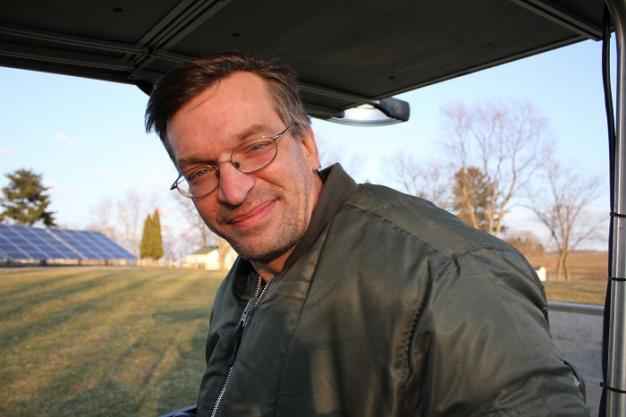Farmers in Pennsylvania taking proceeds from fracking and investing in solar
Dwayne Bauknight says he installed solar panels on his farm to do something good for the environment. (Photo by Margaret J. Krauss.)
Editor’s Note: This story comes by way of the Pennsylvania radio program, The Allegheny Front.
Supporters of hydraulic fracturing — or fracking — say the increasing availability of natural gas gives the U.S. a way to replace coal and oil and provides a bridge fuel to renewable energy sources.
In Marcellus shale country, some farmers with gas leases are using this bridge fuel to get right into solar.
Dwayne Bauknight drives onto his Washington County property in a golf cart. He pulls a U-turn to park between two rows of 15-foot tall solar panels and shows how they work.
“When it’s producing it’ll go through all those inverters, all those yellow things,
and then come out of that straight meter right there,” he said, pointing to various components of his personal power sytem.
Bauknight and his family signed a gas lease with Range Resources in October and used the money to install a 38.4 kilowatt solar array on their farm, Shared Acres.
Seven years ago Bauknight decided to leave a job as a financial advisor and become a farmer. He says his two careers aren’t so different — now he grows food instead of money. He does a lot of the same kind of decision-making, he said, using the same math, analyzing risk.
Bauknight is conflicted about drilling for environmental reasons. But for his family’s sake, weighing the risks, he couldn’t not take the money. So he compromised with himself — and put the money toward building his solar array.
“There’s different ways to sustainability, and one of the ways to sustainability is to take our fossil fuels and invest them in renewable energy,” he said. “I think that’s what we’ve been lacking for a long, long time.”
Just two miles down the road is Duane Miller’s farm. His family has worked this land for five generations. Miller has no qualms about drilling for shale gas and sees it as a boon for farmers like him who were just getting by.
“If someone offered to give you a bunch of money, what would it mean to you?” he said with a laugh. “I got out of debt. I hadn’t been out of debt since I was 18 when I started farming.”
Miller’s no environmentalist. He installed solar panels so he’d be free of energy bills. It also let him quit milking cows and raise beef cattle instead. It’s a lot less work, and he can still afford to farm.
Tim Kelsey, an agricultural economist at Penn State University, is unsurprised some farmers are taking gas money and investing it in solar. He’s been looking at the choices farmers make, broadly.
“The nature of farming involves kind of long-term investments,” he said.
Joe Morinville, who owns Energy Independent Solutions, a solar company near Pittsburgh, has done some research of his own. He estimates 25 percent of his customers are farmers and that of those number, many have turned to solar thanks to gas money.
Solar arrays can come with a six-figure price tag. So while investing in solar might be out of reach for a typical farmer, shale money makes it possible.
“There’s an awful lot of energy that we’re not using in this country that’s here. It’s just a matter of harnessing it, getting the technology to use it. It’s not free energy, but it comes close,” Miller said.
